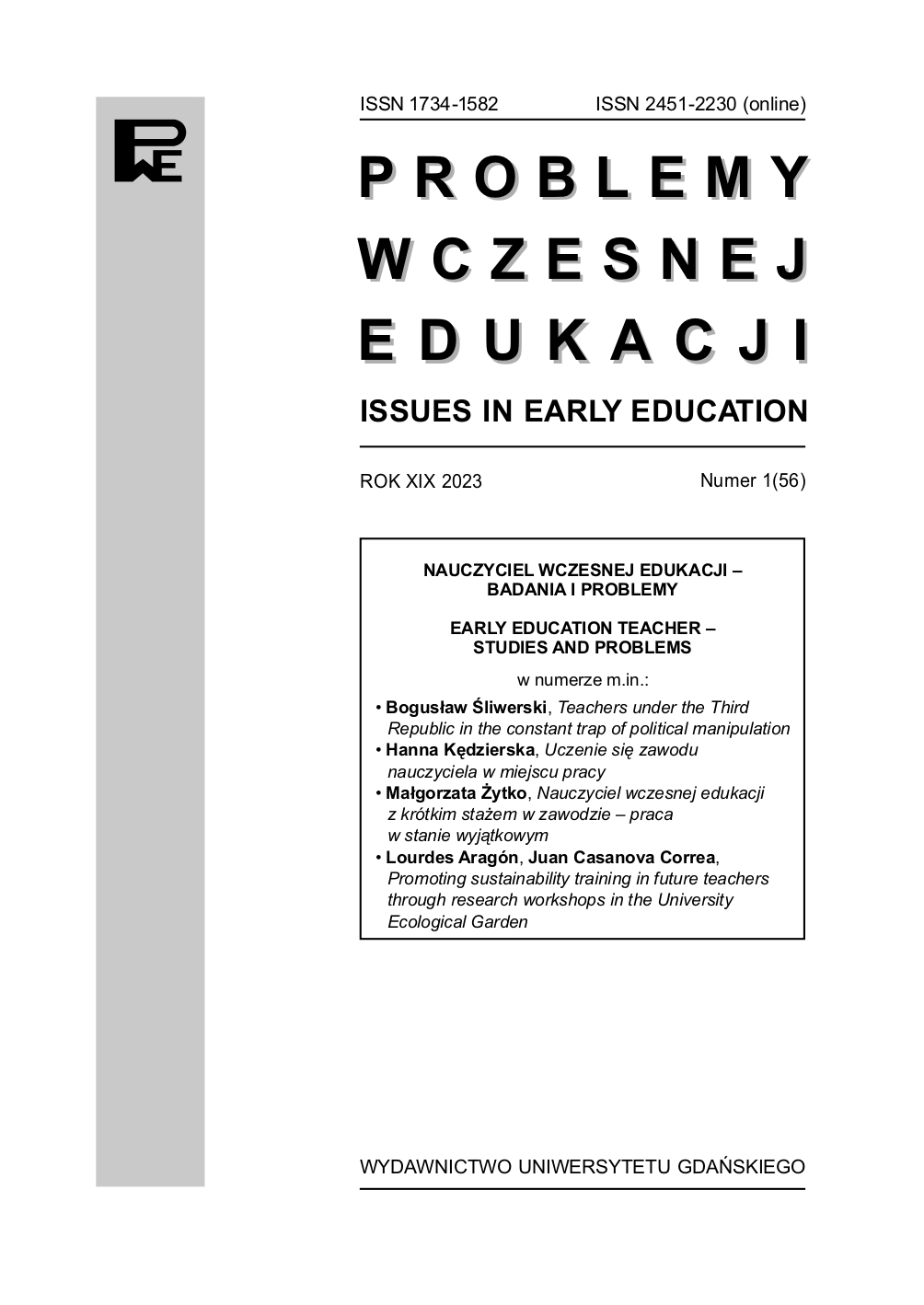Uczenie się zawodu nauczyciela w miejscu pracy
DOI:
https://doi.org/10.26881/pwe.2023.56.02Słowa kluczowe:
uczenie się nauczycieli, uczenie się w miejscu pracy, strategie uczenia się, organizacje uczące sięAbstrakt
In the article I provide an overview of some of the themes and perspectives within existing academic literature concerning workplace learning. I have analysed the category of teacher’s learning in the workplace in terms of the degree of connection between “learning” and “work” in the three broad approaches: the workplace as a site for learning; the workplace as a learning environment; and learning and working as inextricably linked.
Downloads
Bibliografia
Bańka A. (2010), Konsumpcja afordancji środowiskowych: przestrzenna lokacja i relokacja tożsamości. W: A.M. Zawadzka, M. Górnik-Durose (red.), Życie w konsumpcji, konsumpcja w życiu. Sopot, Gdańskie Wydawnictwo Psychologiczne.
Bauer J., Gruber H. (2007), Workplace changes and workplace learning: advantages of an educational micro perspective. „International Journal of Lifelong Education”, 26(6). DOI: 10.1080/ 02601370701711364.
Billett S. (2001), Learning through work: workplace affordances and individual engagement. „Journal of Workplace Learning”, 13(5). DOI: 10.1108/EUM0000000005548.
Billett S. (2002), Critiquing workplace learning discourses: Participation and continuity at work. „Studies in the Education of Adults”, 34(1). DOI: 10.1080/02660830.2002.11661461.
Boud D., Garrick J. (eds.) (1999), Understanding Learning at Work. London–New York, Routledge.
Boud D., Solomon N. (eds.) (2001), Work-based learning: a new higher education? Buckingham, McGraw-Hill Education.
Czubak-Koch M. (2014), Uczenie się w kulturze miejsca pracy. Wrocław, Wydawnictwo DSW.
Ellström P.-E. (2001), Integrating Learning and Work: Problems and Prospects. „Human Resource Development Quarterly”, 12(4). DOI: 10.1002/hrdq.1006.
Engeström Y. (2001), Expansive learning at work: Toward an activity theoretical reconceptualization. „Journal of Education and Work”, 14(1).
Engeström Y., Kerosuo H. (2007), From workplace learning to inter‐organizational learning and back: the contribution of activity theory. „Journal of Workplace Learning”, 19(6). DOI: 10.1108/13665620710777084.
Engeström Y., Sannino A. (2012), Badania nad ekspansywnym uczeniem się: założenia, wnioski i przyszłe wyzwania. „Forum Oświatowe”, 46(1).
Eraut M. (2004), Informal Learning in the Workplace. „Studies in Continuing Education”, 26. DOI: 10.1080/158037042000225245.
Fenwick T. (2008), Workplace learning: Emerging trends and new perspectives. „New Directions for Adult and Continuing Education”, 119. DOI: 10.1002/ace.302.
Fuller A., Unwin L. (2003), Learning as Apprentices in the Contemporary UK Workplace: Creating and Managing Expansive and Restrictive Participation. „Journal of Education and Work”, 16(4). DOI: 10.1080/1363908032000093012.
Gołębniak B.D. (2020), Konstruktywistyczna edukacja do konstruktywistycznego nauczania. Redefinicja relacji teorii i praktyki w akademickim kształceniu nauczycieli. „Problemy Wczesnej Edukacji”, 51(4). DOI: 10.26881/pwe.2020.51.03.
Gołębniak B.D., Zamorska B. (2014), Nowy profesjonalizm nauczycieli. Podejścia – praktyka – przestrzeń rozwoju. Wrocław, Wydawnictwo DSW.
Hager P. (2001), Workplace judgment and conceptions of learning, „Journal of Workplace Learning”, 13(7/8). DOI: 10.1108/EUM0000000006123.
Hager P. (2004), Conceptions of learning and understanding learning at work. „Studies in Continuing Education”, 26(1). DOI: 10.1080/158037042000199434.
Hodkinson H., Hodkinson Ph. (2005), Improving school teachers’ workplace learning. „Research Papers in Education”, 20(2). DOI: 10.1080/02671520500077921.
Kędzierska H. (2022), Przerwanie kariery – doświadczenia tranzycji zawodowych nauczycieli gimnazjów, „Colloquium”, 14(3). DOI: 10.34813/29coll2022.
Kos E. (2018), Uczenie się i nauczanie innych w miejscu pracy kobiet sukcesu. „Edukacja Ustawiczna Dorosłych”, 4.
Lave J., Wenger E. (1991), Situated learning: Legitimate peripheral participation. Cambridge, Cambridge University Press.
Le Clus M.A. (2011), Informal learning in the workplace: A review of the literature. „Australian Journal of Adult Learning”, 51(2).
Malewski M. (2006), W poszukiwaniu teorii uczenia się ludzi dorosłych. „Teraźniejszość – Człowiek – Edukacja”, 34(2).
Markowska M. (2020), Przegląd systematyczny krok po kroku. Przewodnik dla początkujących badaczy reprezentujących nauki społeczne. Warszawa, Wydawnictwo SGGW.
Rozkosz E. (2017), Teoria Etienne’a Wengera w badaniach usytuowanego uczenia się kompetencji informacyjnych. „Forum Oświatowe”, 29(1).
Senge P. (2012), Piąta dyscyplina. Teoria i praktyka organizacji uczących się. Warszawa, Wolters Kluwer.
Sfard A. (1998), On Two Metaphors for Learning and the Dangers of Choosing Just One. „Educational Researcher”, 27(2).
Stern E., Sommerlad L. (1999), Workplace learning, culture and performance. London, Institute of Personnel and Development, International Federation of Training and Development Organizations.
Tynjälä P. (2008), Perspectives into learning at the workplace. „Educational Research Review”, 3(2).
Vaughan K. (2008), Workplace Learning: A literature review. Auckland, Competenz.
Źródła internetowe
Engeström Y. (1991), Non scolaesed vitae discimus: Toward overcoming the encapsulation of school learning. “Learning and Instruction”, http://quote.ucsd.edu/lchcautobio/files/2015/10/ Engestrom-1991-Non-Scolae-Sed-Vitae-Dzsczmus-Toward-Overcoming-the-Encapsulation-ofSchool-Learning.pdf, 11.03.2020.
Pyżalski J., Walter N. (2021), Edukacja zdalna w czasie pandemii COVID-19 w Polsce – mapa głównych szans i zagrożeń, https://operon.pl/Edukacja_zdalna_w_czasie_pandemii_COVID-19. pdf, 12.04.2023.

 Uniwersyteckie Czasopisma Naukowe
Uniwersyteckie Czasopisma Naukowe





